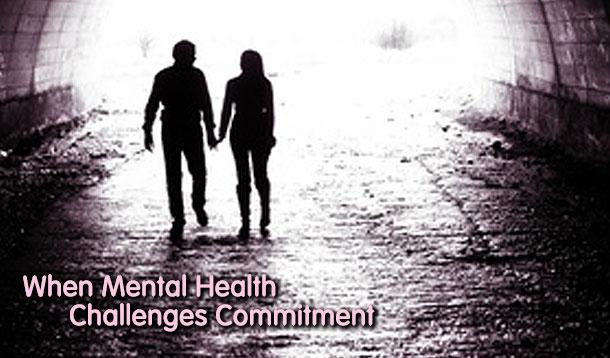
Ever tackled something that seemed insurmountable? Has your relationship ever faced such extreme challenges that you thought it wouldn't last?
Mark Lukach, a husband and father, talks about both the journey of his relationship with his wife, Giulia, while she struggled with mental health issues, and the idea of commitment in relationships. They made it through times of acute psychoses, two psychiatric ward stays, and everything in between. Giulia's health has returned and together with their son they are finding balance and stability in their life. Mark decided to share their story of hope for others in similar, seemingly bleak, situations.
Facing a mental health diagnosis in your relationship is painful, confusing, and challenging. In some cases, like Giulia's, there were no signs until three years into their marriage. In other cases, it has been an ongoing struggle for the one you love, with easier and harder times.
If your partner is struggling with mental health, you are not alone. There is hope that begins with understanding. Here are some ways forward:
Educate Yourself:
Get books, go online, talk to care providers and medical professionals, contact the CMHA. Increase your understanding. Mental health issues can feel overwhelming; education can provide a greater sense of control and hope.
Know Your Limits and Your Family's Limits:
Let go of added stress and expectations. Know what you can and can't do while being their for your partner. Make decisions that are right for your family—this might be in the area of safety, knowing when your partner can't care for your children, or if you need to lock up medication. Perhaps you might decide to drop some activities or maintain them for balance and normalcy. Evaluate and accept limitations.
Have a Crisis Plan in Place:
Crises are less difficult when anticipated. Have a plan for who you can call or where you can go in various scenarios. List critical numbers, such as your Psychiatrist or a crisis line. Have a plan for your children, as well. If it arises, address any abusive behaviours and know that at no time should you stay in a dangerous situation.
Honour Your Feelings and Experience, and Reach Out to Others:
Talk about your feelings to a trusted friend, professional, or support group. Your feelings are valid, understandable, and allowed in this process. Ask for help from family and friends, as they often struggle with knowing what they can do. A specific request (a meal, school drop off help, shovelling snow, etc.) will be happily received and responded to.
Practice Patience:
Try practiciing patience with your partner. Their actions and thoughts are often out of their control and upsetting to them. Again, having support for yourself and someone to talk to might help you vent your feelings in a healthy way and not in ways you might regret.
Take Time for Yourself:
A caregiving role will take its toll, think of the airplane oxygen mask and put yours on before you help others. Invest in self-care before you take on the care of another, or there will be nothing left to give.
Value the Journey:
Mark says that although it was hard, he misses how much they relied on each other during that time, living moment to moment, and how much they talked and shared even when the conversations were difficult, terrifying, and without answers. This experience is to be honoured and learned from for future times of health when the trite can cause arguments.
Keep the Faith:
For Mark, it was knowing others have survived and they could too. He committed and had faith they would make it somehow, and be stronger because of it. Her hospital stay was terrifying, her suicidal thoughts caused constant anxiety, and when she was heavily medicated, he felt very alone. But Mark says, “When she came out of that darkness, and we stood there together, blinking in the sunlight... realizing we made it... and in fact we made it because of each other... that's the greatest feeling you can have in life. Nothing compares. The victory only tasted sweet because of how hard it was to achieve. So commitment... [has] shown me the greatest gift and joy in life is in loving someone and being loved in return. No matter what.”
They painstakingly made it. A journey with no guarantees. Naturally, others have not made it out together for their own reasons; however, this story is about possibilities and the honour of commitment. Mark says of those who say they couldn't have done it, “You don't know who you are until you are there.” In her book, The Inspired Caregiver: Finding Joy While Caring for Those You Love, Tia Walker states that “caregiving often calls us to lean into love we didn't know possible.” His story encourages that we all have strength we didn't know existed.
Being a caregiver is exhausting—both mentally and physically. Don't forget to breathe, and take time out to de-stress.